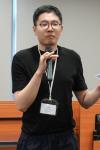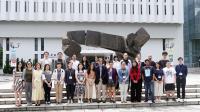Young Scholars' Forum in Chinese Studies 2019, organised by CCK-APC and ICS, was held on 23–25 May 2019 at The Chinese University of Hong Kong. The forum aims to nurture young scholars in Chinese Studies and strengthen their academic networks. With the theme "A Century of Change: Revisiting the Legacy of May Fourth", this year's forum had invited a total of 33 young scholars to present their research papers. The papers were divided into 11 panels and scheduled over a period of three days. Participants presented their findings in a wide range of topics relating to the May Fourth, including intellectuals, generation of students, youth movement, Chinese traditions, the New Woman, women's movement, the classics and the Chinese society. Professors from various CUHK departments, such as History, Chinese Language and Literature, Translation, and Cultural and Religious Studies were invited to serve as discussants. This year's forum received 144 applications. After a rigorous selection by the Organising Committee, 33 applicants were invited, which comprised 5 from Hong Kong, 10 from Mainland China, 8 from other Asian countries and territories including Taiwan, South Korea and Japan, and another 10 from Europe, North America and Australia. More than half of them came from overseas, reflecting the forum's effort to enhance international communication in Chinese studies. Below are the sharing from two of the participants: |
Jessica Zu (Princeton University)  The theme for the 2019 forum is a centennial reflection on the May Fourth legacy. As a scholar of Buddhist studies and religious studies, I was initially hesitant about participating in it, even though the primary materials I analysed reveal many interconnections between the transformation of Buddhism and the long Chinese revolution 1911–1976. I am very happy that I had stepped out of my comfort zone of Buddhist studies into the unfamiliar waters of the history of revolution in modern China. I not only received candid feedback from my discussants and from private conversations with new friends during forum-sponsored lunches and dinners, but also met new colleagues who were toiling for similar theoretical rethinking of Chinese Buddhism but working with different primary sources. Both the formal presentations and informal coffee breaks, lunches, and dinners proved to be fertile grounds for floating ideas around and sparking new insights. All this is not accidental. From its inception, the organisers of this forum had sought to build an interdisciplinary platform for early career scholars to exchange ideas and establish a broader professional network. Equally important, in this forum, one can personally experience the renowned CUHK paradigm of review (中大點評範式), which challenges one to try new methods to answer one's research questions and to open one's eyes to new perspectives for refining and strengthening the arguments. Every project could become better and every argument could become stronger by being critiqued under this paradigm. By design, this forum is ideal for those seeking development feedback to broaden one's own scholarly purview, to identify weaknesses in the project, to sharpen the arguments, and to bring one's own niche project into broader academic conversations. Wang Xing (Fudan University) As the theme of this year's forum, "A Century of Change: Revisiting the Legacy of May Fourth" entails an understanding of the May Fourth not only as a single and isolated historical event, but a culture that is continuously influencing and moulding Chinese society. This year's papers very much focused on such a kind of continuation of the May Fourth culture. The pursuit of a modern and independent China via social as well as intellectual revolutions in the May Fourth did not only open up new conduits of discourse for the educated elites, but also totally transformed China on many other levels. In the forum, scholars like Shao Dong, Qu Nan, Yeung Choi Kit and Huang Shiqi gave their new insights on how literature, literary theories, and "classical" intellectual debates can be reinterpreted with new perspectives, especially on how we should rethink May Fourth intellectuals' understanding of "traditional China". Many other colleagues in the forum, on the other hand, presented new documents and visual materials about certain fields and spheres of China in and after May Fourth that had seldom been touched by academic studies before. If "revisiting" the May Fourth was a task this forum assigned to its participants, I think every speaker has completed the task well. We not only "revisited" the classical debates in the May Fourth with new ideas, but also "problematised" the May Fourth with all kinds of new findings. We have realised through fervent discussions in each panel that the May Fourth is not a flat image of the past, but a "multi-dimensional" movement with so many faces which resists any reductionist labels.
|

















